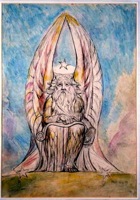Difference between revisions of "Recording angels"
m (Text replacement - "http://nordan.daynal.org" to "https://nordan.daynal.org") |
m (Text replacement - "http://" to "https://") |
||
| Line 1: | Line 1: | ||
[[File:lighterstill.jpg]][[File:Recording_Angel_WmBlake.jpg|right|frame]] | [[File:lighterstill.jpg]][[File:Recording_Angel_WmBlake.jpg|right|frame]] | ||
| − | The '''Recording angel''' is, in [ | + | The '''Recording angel''' is, in [https://en.wikipedia.org/wiki/Angels_in_Judaism Judaic], [https://en.wikipedia.org/wiki/Angels_in_Christianity Christian] and [https://en.wikipedia.org/wiki/Angels_in_Islam Islamic angelology], one or more [[angels]] assigned by [[God]] with the task of recording the [[events]], [[actions]], and/or [[prayers]] of each individual human. In the [https://nordan.daynal.org/wiki/index.php?title=Book_of_Malachi#Chapter_.3 Book of Malachi 3:16], the prophet describes Heaven as having conferring angels, and "The LORD took note and [[listened]], and a book of [[remembrance]] was written before him of those who revered the LORD and thought on his name." In Judaic thought, [[Gabriel]] is the principal recording angel, as shown in [https://nordan.daynal.org/wiki/index.php?title=Book_of_Ezekiel#Chapter_9 Ezekiel 9:3-4], where he is "the man clothed in linen, who had the writing case at his side" who put the mark of [[Passover]] on Jewish houses in Egypt. |
| − | In the ''[ | + | In the ''[https://en.wikipedia.org/wiki/Secrets_of_Enoch Secrets of Enoch]'' (also known as ''Second Enoch'', or ''Slavonic Enoch'') the ''recording angel'' is named Pravuil or Vretil: "And the Lord summoned one of his [[archangels]] by name Pravuil, whose [[knowledge]] was quicker in [[wisdom]] than the other archangels, who wrote all the deeds of the Lord..." |
| − | In [[Islam]] the two recording angels are called Raqib and Atid that record human [[speech]] each record [[faithful]] or [[blasphemous]] speeches, and also record human's deed. They are considered as the [ | + | In [[Islam]] the two recording angels are called Raqib and Atid that record human [[speech]] each record [[faithful]] or [[blasphemous]] speeches, and also record human's deed. They are considered as the [https://en.wikipedia.org/wiki/Kiraman_Katibin Kiraman Katibin] angels, the two angels, believed by many Muslims, who record a person's good and bad deeds. |
To a degree, the recording angel overlaps with the [[Guardian angel]] in [[Christian]] theology. The guardian angel serves as an individual's recording angel. | To a degree, the recording angel overlaps with the [[Guardian angel]] in [[Christian]] theology. The guardian angel serves as an individual's recording angel. | ||
Latest revision as of 02:36, 13 December 2020
The Recording angel is, in Judaic, Christian and Islamic angelology, one or more angels assigned by God with the task of recording the events, actions, and/or prayers of each individual human. In the Book of Malachi 3:16, the prophet describes Heaven as having conferring angels, and "The LORD took note and listened, and a book of remembrance was written before him of those who revered the LORD and thought on his name." In Judaic thought, Gabriel is the principal recording angel, as shown in Ezekiel 9:3-4, where he is "the man clothed in linen, who had the writing case at his side" who put the mark of Passover on Jewish houses in Egypt.
In the Secrets of Enoch (also known as Second Enoch, or Slavonic Enoch) the recording angel is named Pravuil or Vretil: "And the Lord summoned one of his archangels by name Pravuil, whose knowledge was quicker in wisdom than the other archangels, who wrote all the deeds of the Lord..."
In Islam the two recording angels are called Raqib and Atid that record human speech each record faithful or blasphemous speeches, and also record human's deed. They are considered as the Kiraman Katibin angels, the two angels, believed by many Muslims, who record a person's good and bad deeds.
To a degree, the recording angel overlaps with the Guardian angel in Christian theology. The guardian angel serves as an individual's recording angel.
Quote
When a seraphic pair accept guardian assignment, they serve for the remainder of the life of that human being. The complement of being (one of the two angels) becomes the recorder of the undertaking. These complemental seraphim are the recording angels of the mortals of the evolutionary worlds. The records are kept by the pair of cherubim (a cherubim and a sanobim) who are always associated with the seraphic guardians, but these records are always sponsored by one of the seraphim. 113:2.9
